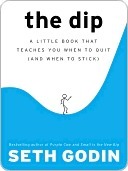More on this book
Community
Kindle Notes & Highlights
by
Seth Godin
Read between
July 14 - July 15, 2021
You really can’t try to do everything, especially if you intend to be the best in the world.
Now there are a million micromarkets, but each micromarket still has a best.
the people who are the best in the world specialize at getting really good at the questions they don’t know.
Stick with the Dips that are likely to pan out, and quit the Cul-de-Sacs to focus your resources.
The brave thing to do is to tough it out and end up on the other side—getting all the benefits that come from scarcity.
A woodpecker can tap twenty times on a thousand trees and get nowhere, but stay busy. Or he can tap twenty-thousand times on one tree and get dinner.
If you choose this path, it’s because you realize that there’s a Dip, and you believe you can get through it.
Politicians fully expect that the lazy and ill-informed won’t bother to vote. These citizens pay taxes, which support the political life of the few who don’t quit the system.
There are people and organizations that can help you later but only if you invest the time and effort to work with them now, even though now is not necessarily the easy time for you to do it.
Giving up control and leaning into the organization gives you leverage.
If you can get through the Dip, if you can keep going when the system is expecting you to stop, you will achieve extraordinary results.
The next time you catch yourself being average when you feel like quitting, realize that you have only two good choices: Quit or be exceptional. Average is for losers.
If it takes ten impressions to make an impact, and you’ve delivered eight, that switch is going to cost you a lot of time and money.
Selling is about a transference of emotion, not a presentation of facts.
“I’m getting through this Dip with you because it’s important to both of us” is the very best signal to send.
Microsoft failed twice with Windows, four times with Word, three times with Excel.
But no, you mustn’t quit a market or a strategy or a niche.
decide once and for all whether you’re in a market or not. And if you are, get through that Dip.
Short-term pain has more impact on most people than long-term benefits do, which is why it’s so important for you to amplify the long-term benefits of not quitting. You need to remind yourself of life at the other end of the Dip because it’s easier to overcome the pain of yet another unsuccessful cold call if the reality of a successful sales career is more concrete.
Quitting the projects that don’t go anywhere is essential if you want to stick out the right ones. You don’t have the time or the passion or the resources to be the best in the world at both.
The time to look for a new job is when you don’t need one. The time to switch jobs is before it feels comfortable.
Quitting is better than coping because quitting frees you up to excel at something else.
“Never quit something with great long-term potential just because you can’t deal with the stress of the moment.” Now that’s good advice.
You can always quit later—so wait until you’re done panicking to decide.
Sure, some of the people in a market have considered you (and even rejected you). But most of the people in the market have never even heard of you. The market doesn’t have just one mind. Different people in the market are seeking different things.
People in the market talk to each other. They are influenced by each other. So every step of progress you make actually gets amplified.
Write down under what circumstances you’re willing to quit. And when. And then stick with it.
If you are making a decision based on how you feel at that moment, you will probably make the wrong decision.
If you enter a market that’s too big or too loud for the amount of resources you have available, your message is going to get lost.
How dare you settle for mediocre just because you’re busy coping with too many things on your agenda, racing against the clock to get it all done.


